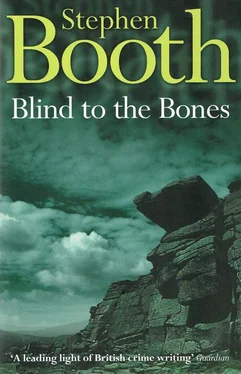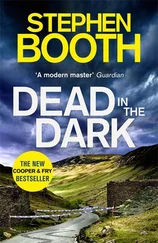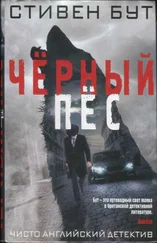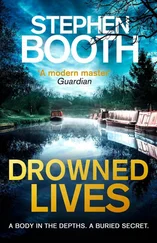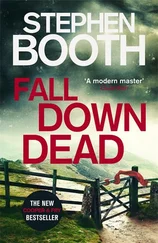‘Some of them told me the dance symbolized killing the rats in the old railway tunnels where the navvies worked.’
‘That could be so,’ said Alton. ‘Nobody can know for sure now. It’s passed down from one generation to the next, and it gets changed along the way, because nothing is ever written down. Each year it changes a bit more, depending on the people involved.’
‘How is it you know so much about these traditions, sir?’
‘I’m a morris man myself, I have to admit,’ said Alton. ‘I danced Cotswold morris in a previous parish.’
‘With the bells and hankies?’
‘Yes.’
‘Pagan origins again?’
‘Pagan or not, every dance has its own meaning. A spiritual dimension. The rituals are important, of course. Dressing up, setting aside a special day, learning the words and the movements. All part of the ritual. There’s even a sacred space for the dancers to perform in. In religion, it’s called the “temenos”. But ritual isn’t quite enough. If the moments of spiritual connection are going to happen, you have to commit, you have to invest belief in it.’
Cooper noted that the Border Rats seemed to have sparked a bit more interest than a mention of Jesus.
‘But this is very limited. It seems to be entirely members of the Oxley family.’
‘Not really,’ said Alton. ‘These days, some of the Border Rats live in Hey Bridge. The two groups hardly speak to each other outside rehearsals, but when they’re performing, they hardly seem to know who’s who. There’s never any shortage of volunteers to join. Lucas Oxley’s rule is to give places to those who live nearest to Withens, but as long as they’re willing to give everything when they’re Border Rats, Lucas doesn’t care. If they treat the Rats as a joke, they’re out.’
‘Thank you,’ said Cooper. ‘That was very interesting.’
‘And no earthly use to you at all, I’m sure.’
‘Well...’
‘The thing to remember is that morris isn’t really terribly, terribly old. And there’s no inherent mystical meaning, only what the individual puts into it. But it has grown out of our own culture and history, and it belonged to generations of our own ancestors. That’s why it’s important.’
Ben Cooper looked at his watch as he and Tracy Udall turned back on to the A628 towards Longdendale. There were several active lines of enquiry that he could be helping out with now. But as she drove along the reservoirs, Udall was still thinking about cholera.
‘Do you know, there was a notorious murder here around the time of that cholera outbreak,’ she said. ‘It was a case that would have defeated even Derbyshire Constabulary, if it had existed in those days.’
‘What was that?’
‘The Woodhead Tunnel Murder. Not heard of it?’
‘No.’
‘It was in 1849.’
‘Oh, well. The Constabulary wasn’t formed until 1857. Besides, Longdendale was in Cheshire until 1974. There might have been a petty constable or something, but a magistrate would have taken charge in a murder case. Where did it happen?’
‘In the shanty town where the navvies lived. The place had already became notorious, but this was just after the cholera outbreak. One of the big problems the navvies faced was the contract system. In fact, it was a complicated process of sub-contracting, called “truck”. At every level, there was someone who creamed off some of the money for themselves by reducing supplies, buying the cheapest food, cutting corners. You can imagine.’
‘Yes. That hasn’t changed much.’
‘Well, one of the worst sub-contractors was a man called Nathan Pidcock. He was a local man, who ran a haulier’s business from Tintwistle. He jumped at the chance of getting involved in the tunnel project, because there were big profits to be made. By all accounts, he made a lucrative business for himself by supplying rotting food, dirty water, and substandard materials at inflated prices. The navvies hated him, of course, but they were living in their shanty town in the middle of nowhere, and they relied on people like Pidcock for supplies. Anyway, finally he must have gone too far. The outbreak of cholera was blamed on water polluted by human waste. Dozens of men died over a period of days. And one morning, Nathan Pidcock was found dead in a ditch on the edge of the camp. He had been beaten to death.’
‘And were there no suspects?’
‘Suspects?’ Udall laughed. ‘That’s the question of a twenty-first century policeman. Yes, there were fifteen hundred of them. The theory was that a group of workmen decided to exact their own brand of justice on Pidcock for the deaths of their mates. The rest of the men in the camp must have known what happened, but nobody said a word. So the authorities were helpless.’
‘A conspiracy of silence?’
‘I expect these days we could have done a mass DNA test or something.’
‘Only if there was some blood, or traces of other bodily fluids from the perpetrators at the scene, or Pidcock’s blood on their clothing. But basically, you’re right — there would certainly have been some forensic evidence to follow up.’
‘There was one witness, though,’ said Udall. ‘Nathan Pidcock had a young assistant, a lad called John Cobb. He helped with deliveries to the camp. But he was only about fourteen, and the attackers left him alone.’
‘Wasn’t Cobb able to identify anyone?’
‘No. He saw the whole thing, but couldn’t point out any one of his employer’s attackers. His story was that they had disguised themselves. He said they all had their faces blacked up.’
Cooper wasn’t surprised. The continuity seemed to be there even now, a tradition passed down through the generations. Maybe the Oxleys were direct descendants of those railway navvies who had died building the tunnels. Maybe their ancestors had lived in the shanty town, which seemed to be treated as the village’s dirty little secret.
He recalled the superstition that Sandy Norton had mentioned about the tunnels. Those workmen were right that an evil had been brought down on them by the tunnelling project. But it hadn’t been caused by some primeval force that had slept for eons under the hill and had been disturbed by their blasting. It had been a much more human evil. Its cause was greed.
The second time Ben Cooper met his new neighbour, it was on neutral territory again. He had arrived home and was fiddling around in his pockets for his door key. It had been a hard day, and his mind was full of fragments of conversation, and pictures of young Oxleys he couldn’t put the right name to.
As he managed to get the key into his hand, the door to the other flat opened. Briefly, he wondered whether Peggy Check had been listening for him coming in. If Dorothy Shelley was the only person she knew in Edendale, she might be getting desperate for a bit of normal human contact. Cooper immediately felt guilty that he hadn’t made an effort to be more sociable.
‘Hello, how’s it going?’ he said.
‘Great, thanks. And you?’
Cooper knew he was probably a bit dishevelled at the end of his shift, rather unshaven and maybe a bit grubby.
‘Fine. I’m sorry, I’m just home from work.’
He opened his door, still feeling a little embarrassed. He thought perhaps he didn’t smell too good either.
‘You must come in for a coffee some time.’
‘Sure. That would be great.’
‘Good.’
He nodded and smiled, thinking there was probably a next step, but not quite able to bring it to mind.
‘When?’ said Check.
‘Oh, er... tonight, if you like. Eight? Eight-thirty?’
‘Fine. See you later then, Ben.’
Cooper fed the cats, showered, changed and thought about having something to eat. His stomach told him he was starving. But he couldn’t face rummaging through the freezer compartment. Not another frozen Chinese meal for one. But he had time to nip down to the Hanging Gate for a bar meal before Peggy Check called.
Читать дальше
Конец ознакомительного отрывка
Купить книгу
